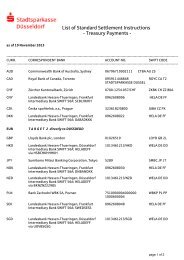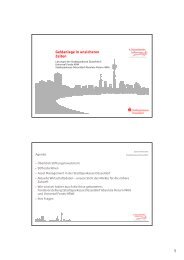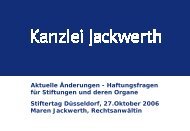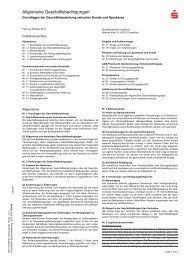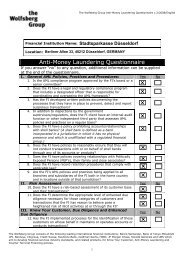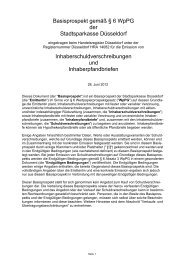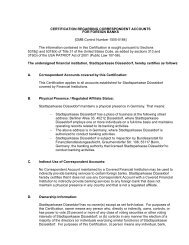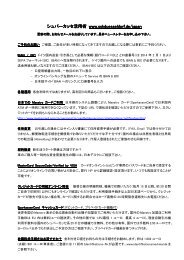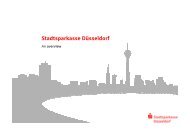und Giroverband Inside the Savings Banks Finance Group S
und Giroverband Inside the Savings Banks Finance Group S
und Giroverband Inside the Savings Banks Finance Group S
You also want an ePaper? Increase the reach of your titles
YUMPU automatically turns print PDFs into web optimized ePapers that Google loves.
S<br />
Finanzgruppe<br />
Deutscher Sparkassen- <strong>und</strong> <strong>Giroverband</strong><br />
<strong>Inside</strong> <strong>the</strong> <strong>Savings</strong> <strong>Banks</strong> <strong>Finance</strong> <strong>Group</strong>
Contents<br />
Are <strong>Savings</strong> <strong>Banks</strong> state-owned banks?<br />
<strong>Savings</strong> <strong>Banks</strong> are legally and economically independent<br />
institutions. They are “incorporated <strong>und</strong>er public law”, but<br />
are not owned by governments or municipalities.<br />
see page 2<br />
What is <strong>the</strong> <strong>Savings</strong> <strong>Banks</strong>’<br />
market position?<br />
<strong>Savings</strong> <strong>Banks</strong> are regional retail banks. They have been<br />
<strong>the</strong> most important provider of f<strong>und</strong>s for small and<br />
medium-sized enterprises in Germany for many years.<br />
<strong>Savings</strong> <strong>Banks</strong> have <strong>the</strong> widest customer coverage in retail<br />
banking in Germany.<br />
see page 8<br />
Do <strong>the</strong> <strong>Savings</strong> <strong>Banks</strong> have a<br />
corporate centre?<br />
The <strong>Savings</strong> <strong>Banks</strong> <strong>Finance</strong> <strong>Group</strong> is not a consolidated<br />
group. Therefore, <strong>the</strong>re is no corporate centre for all<br />
<strong>Savings</strong> <strong>Banks</strong>. Each <strong>Savings</strong> Bank is responsible for its<br />
own operations and branches.<br />
see page 14<br />
How do <strong>Savings</strong> <strong>Banks</strong> support <strong>the</strong>ir<br />
corporate clients internationally?<br />
<strong>Savings</strong> <strong>Banks</strong> provide <strong>the</strong> full range of products and<br />
advisory services – ei<strong>the</strong>r from <strong>the</strong>ir own resources or via<br />
associated companies within <strong>the</strong> <strong>Savings</strong> <strong>Banks</strong> <strong>Finance</strong><br />
<strong>Group</strong>. In addition, <strong>the</strong>y use <strong>the</strong> services of <strong>the</strong>ir international<br />
network partners to support <strong>the</strong>ir clients abroad.<br />
see page 15<br />
What would happen if a <strong>Savings</strong> Bank<br />
became insolvent?<br />
<strong>Savings</strong> <strong>Banks</strong> are protected from insolvency by <strong>the</strong> Joint<br />
Liability Scheme of <strong>the</strong> <strong>Savings</strong> <strong>Banks</strong> <strong>Finance</strong> <strong>Group</strong>. The<br />
scheme ensures that <strong>Savings</strong> <strong>Banks</strong> continue to operate<br />
and that <strong>the</strong>ir liabilities are covered.<br />
see page 19
<strong>Savings</strong> <strong>Banks</strong> <strong>Finance</strong> <strong>Group</strong> | Welcome<br />
1<br />
Welcome to <strong>the</strong><br />
<strong>Savings</strong> <strong>Banks</strong> <strong>Finance</strong> <strong>Group</strong><br />
The <strong>Savings</strong> <strong>Banks</strong> <strong>Finance</strong> <strong>Group</strong> is not a consolidated group. It comprises approximately<br />
600 independent companies with 360,000 employees, making <strong>the</strong> German <strong>Savings</strong> <strong>Banks</strong><br />
<strong>Finance</strong> <strong>Group</strong> <strong>the</strong> largest employer in <strong>the</strong> German banking market. It has an aggregate<br />
business volume of approximately EUR 3,250 billion and is particularly strong in <strong>the</strong> provision<br />
of finance for small and medium-sized enterprises.<br />
A total of 423 <strong>Savings</strong> <strong>Banks</strong> form <strong>the</strong> heart of <strong>the</strong> <strong>Group</strong>. There is a local <strong>Savings</strong> Bank in<br />
every region of Germany, operating a closely knit network of branches. They ensure that all<br />
sections of <strong>the</strong> population have access to, and benefit from, banking services.<br />
The characteristics of <strong>the</strong> <strong>Savings</strong> <strong>Banks</strong> <strong>Finance</strong> <strong>Group</strong> can also be seen as its principal<br />
advantages:<br />
a business model and a legal form which ensure <strong>the</strong> supply of banking<br />
services to <strong>the</strong> wider public.<br />
a focus on <strong>the</strong> regional economy, rooted in <strong>the</strong> business model and in <strong>the</strong><br />
so-called “regional principle”.<br />
strong cooperation within <strong>the</strong> <strong>Group</strong>, sustained by a common trademark<br />
and <strong>the</strong> Joint Liability Scheme.<br />
a decentralised structure, <strong>Group</strong>-wide division of labour and <strong>the</strong> generation<br />
of economies of scope.<br />
As part of its international operations, <strong>the</strong> <strong>Savings</strong> <strong>Banks</strong> <strong>Finance</strong> <strong>Group</strong> operates one of<br />
Europe’s largest clearing houses and is a “hidden champion” in international payment<br />
transactions. With “S-CountryDesk” – its network designed to provide international<br />
support to corporate clients – <strong>the</strong> <strong>Savings</strong> <strong>Banks</strong> <strong>Finance</strong> <strong>Group</strong> is a reliable partner for<br />
business enterprises and banks worldwide.<br />
ONE GROUP<br />
made up of approx. 600 independent financial institutions<br />
50 MIllion CUSTOMERS<br />
have a business relationship with <strong>the</strong> <strong>Savings</strong> <strong>Banks</strong> <strong>Finance</strong> <strong>Group</strong><br />
200 years<br />
of success in <strong>the</strong> market
2<br />
Business model | <strong>Savings</strong> <strong>Banks</strong> <strong>Finance</strong> <strong>Group</strong><br />
What it means to be a <strong>Savings</strong> Bank<br />
The <strong>Savings</strong> <strong>Banks</strong>’ concept combines banking business with<br />
a sense of civic responsibility.<br />
The <strong>Savings</strong> <strong>Banks</strong>’ business model is focused on <strong>the</strong> region<br />
in which <strong>the</strong> <strong>Savings</strong> Bank is based, promoting public welfare<br />
in its home region.<br />
The decentralised structure of <strong>the</strong> <strong>Savings</strong> <strong>Banks</strong> <strong>Finance</strong> <strong>Group</strong><br />
ensures <strong>the</strong> local provision of carefully tailored risk assessment<br />
and customer solutions.<br />
Key drivers: financial inclusion<br />
and sustainable economic and<br />
social development<br />
The historic roots of our business model<br />
The first German <strong>Savings</strong> <strong>Banks</strong> (“Sparkasse”) were established over 200 years ago by<br />
concerned citizens and local governments who wished to provide people on low incomes<br />
with <strong>the</strong> opportunity to deposit <strong>the</strong>ir savings safely. The model of decentralised <strong>Savings</strong><br />
<strong>Banks</strong>, supported by local authorities or municipalities, quickly set a precedent, as it was<br />
in keeping with Germany’s federal structure. Originally, <strong>Savings</strong> <strong>Banks</strong> were active primarily<br />
in <strong>the</strong> savings business; in time, <strong>the</strong>y also increased <strong>the</strong>ir involvement in personal loans<br />
and <strong>the</strong> mortgage business. Today, <strong>Savings</strong> <strong>Banks</strong> are entrepreneurs and taxpayers who<br />
support and shape <strong>the</strong>ir regions.<br />
The first Landesbanken were established in <strong>the</strong> mid-19th century in various parts of<br />
Germany. They developed into central banks for <strong>the</strong> <strong>Savings</strong> <strong>Banks</strong> of a given region and<br />
soon became an important provider of local government finance. Today, Landesbanken<br />
operate both in Germany and abroad. They engage mostly in wholesale activities. However,<br />
Landesbanken have retained <strong>the</strong>ir regional roots and operate as service providers for<br />
<strong>Savings</strong> <strong>Banks</strong>, for example, in more complex product areas.<br />
<strong>Savings</strong> <strong>Banks</strong> have operated as full-service retail banks since <strong>the</strong> beginning of <strong>the</strong> 20th<br />
century. In 1909, <strong>the</strong> advent of cashless payment marked <strong>the</strong> beginning of cooperation<br />
between <strong>Savings</strong> <strong>Banks</strong> and with <strong>the</strong> Landesbanken.<br />
The <strong>Savings</strong> <strong>Banks</strong> <strong>Finance</strong> <strong>Group</strong> has a track record of two centuries of active involvement<br />
in regional development and of financial success in a highly competitive environment.<br />
The idea which led to <strong>the</strong> establishment of <strong>the</strong> <strong>Savings</strong> <strong>Banks</strong> is still valid worldwide to<br />
this day. An example of this can be seen in <strong>the</strong> current microfinance activities and savings<br />
campaigns of many emerging economies.
<strong>Savings</strong> <strong>Banks</strong> <strong>Finance</strong> <strong>Group</strong> | Business model<br />
3<br />
A business model and a legal form which ensure <strong>the</strong> supply of banking services<br />
to <strong>the</strong> wider public<br />
<strong>Savings</strong> <strong>Banks</strong> are focused on conducting business in <strong>the</strong> community or <strong>the</strong> region in<br />
which <strong>the</strong>y are based. They have also maintained <strong>the</strong>ir original focus on encouraging<br />
citizens to accumulate assets, and on providing f<strong>und</strong>s for small and medium-sized<br />
enterprises. Because of this business model, <strong>the</strong> trademark “Sparkasse” is considered to<br />
be a symbol of quality by <strong>the</strong> German public.<br />
<strong>Savings</strong> <strong>Banks</strong> are an integral part of <strong>the</strong>ir regional economic cycle. Their business model<br />
is strongly coloured both by <strong>the</strong>ir historical beginnings and <strong>the</strong>ir legal framework.<br />
Public mandate and social responsibility<br />
The overall role of <strong>Savings</strong> <strong>Banks</strong> is to ensure open and accessible quality financial services<br />
for local private customers, small and medium-sized enterprises and <strong>the</strong> public sector in<br />
<strong>the</strong>ir business regions. They do not exclude any specific client group from <strong>the</strong>ir services,<br />
or limit <strong>the</strong> range of financial products available to low-income households or small<br />
businesses. Unlike most private banks, <strong>the</strong>y provide full retail services even in remote<br />
and low-income regions. Fur<strong>the</strong>rmore, <strong>the</strong>y are required to ensure a sufficient degree of<br />
competition in <strong>the</strong> banking sector. These obligations – also referred to as “public mandate” –<br />
are laid down by law.<br />
Balancing growth with public<br />
welfare<br />
The Common Basis of <strong>the</strong> <strong>Group</strong>’s Structure Ensures <strong>the</strong> Success of its Business model<br />
Characteristics of <strong>the</strong> <strong>Savings</strong> <strong>Banks</strong> <strong>Finance</strong> <strong>Group</strong><br />
Cooperation within <strong>the</strong> <strong>Group</strong> Decentralised <strong>Group</strong> structure Operational efficiency<br />
Constitutive elements of <strong>Savings</strong> <strong>Banks</strong><br />
Public legal structure Municipal trusteeship Public mandate Regional principle
4<br />
Business model | <strong>Savings</strong> <strong>Banks</strong> <strong>Finance</strong> <strong>Group</strong><br />
Welfare maximisation instead<br />
of profit maximisation<br />
<strong>Savings</strong> <strong>Banks</strong> apply <strong>the</strong>ir net<br />
income to promote sustainable<br />
development<br />
<strong>Savings</strong> <strong>Banks</strong> are fully exposed to market forces. They operate according to commercial<br />
principles and <strong>the</strong>ir survival depends on <strong>the</strong>ir intrinsic capacity to generate adequate<br />
profits to f<strong>und</strong> <strong>the</strong>ir business operations. They are f<strong>und</strong>ed through deposits, ra<strong>the</strong>r than<br />
municipal f<strong>und</strong>s. A <strong>Savings</strong> Bank’s profits are used exclusively to streng<strong>the</strong>n its financial<br />
base and to provide benefits for society. And in order to maintain consistent services for<br />
<strong>the</strong>ir clients, <strong>Savings</strong> <strong>Banks</strong> do not strive for short-term profit maximisation, as this may<br />
produce high risks in <strong>the</strong> long term.<br />
<strong>Savings</strong> <strong>Banks</strong> use <strong>the</strong> revenue <strong>the</strong>y generate to sponsor a wide variety of communitybased<br />
activities. The volume of <strong>the</strong>se f<strong>und</strong>ing activities amounts to more than €500 million<br />
per year. <strong>Savings</strong> <strong>Banks</strong> primarily sponsor charitable causes and cultural and sports<br />
activities, as well as research and scientific, environmental and business development<br />
<strong>Savings</strong> <strong>Banks</strong> apply <strong>the</strong>ir net income to promote sustainable development<br />
Region<br />
<br />
<strong>Savings</strong> Bank<br />
Net income<br />
Reserves<br />
Deployed to<br />
benefit <strong>the</strong><br />
common good<br />
within <strong>the</strong> respective<br />
business<br />
region
<strong>Savings</strong> <strong>Banks</strong> <strong>Finance</strong> <strong>Group</strong> | Business model<br />
5<br />
projects. All citizens stand to gain from this f<strong>und</strong>ing: whe<strong>the</strong>r as members of local associations,<br />
as visitors to <strong>the</strong>atres and museums, or as parents whose children benefit from <strong>the</strong><br />
educational institutions sponsored by <strong>Savings</strong> <strong>Banks</strong>.<br />
Key elements of <strong>the</strong> legal structure<br />
Like all o<strong>the</strong>r credit institutions in Germany, <strong>Savings</strong> <strong>Banks</strong> are subject to federal legislation<br />
(<strong>the</strong> German Banking Act [KWG]) and require a banking licence. They are also subject<br />
to general banking supervision, which is carried out by <strong>the</strong> German Federal Financial<br />
Supervisory Authority (BaFin) and <strong>the</strong> German Central Bank (B<strong>und</strong>esbank).<br />
Common legal gro<strong>und</strong><br />
with all German banks<br />
Due to <strong>the</strong>ir specific legal nature, <strong>Savings</strong> <strong>Banks</strong> are also subject to legislation adopted by<br />
Germany’s federal states. This legislation relates to <strong>the</strong> organisational structure and <strong>the</strong><br />
particular obligations of <strong>Savings</strong> <strong>Banks</strong>, and is also reflected in <strong>the</strong>ir business model.<br />
Who owns <strong>the</strong> <strong>Savings</strong> <strong>Banks</strong>?<br />
In <strong>the</strong> early days, <strong>Savings</strong> <strong>Banks</strong> were mostly run as legally dependent institutions by<br />
local authorities. However, <strong>Savings</strong> <strong>Banks</strong> have been independent institutions for many<br />
decades, most of <strong>the</strong>m trading as “institutions incorporated <strong>und</strong>er public law” 1 .<br />
In Germany, a municipality is <strong>the</strong> responsible public body of a <strong>Savings</strong> Bank – but not its<br />
owner. <strong>Savings</strong> <strong>Banks</strong> operate <strong>und</strong>er “municipal trusteeship”. “Municipality” can mean a<br />
city, town or district, or a municipal special-purpose association of local authorities with<br />
<strong>the</strong> function of jointly running a <strong>Savings</strong> Bank. The municipality has no shares. Today’s<br />
<strong>Savings</strong> <strong>Banks</strong> can be compared to fo<strong>und</strong>ations <strong>und</strong>er public law.<br />
<strong>Savings</strong> <strong>Banks</strong> are not state-owned<br />
Landesbanken, however, are primarily owned by Germany’s federal states and by <strong>the</strong> <strong>Savings</strong><br />
<strong>Banks</strong> based in that respective federal state.<br />
1<br />
The six “independent <strong>Savings</strong> <strong>Banks</strong>” are an exception to this rule. While <strong>the</strong>ir legal structure is that of a fo<strong>und</strong>ation<br />
or an “incorporated society established for economic purposes”, <strong>the</strong>y are fully integrated into <strong>the</strong> <strong>Savings</strong> <strong>Banks</strong><br />
<strong>Finance</strong> <strong>Group</strong>.
6<br />
Business model | <strong>Savings</strong> <strong>Banks</strong> <strong>Finance</strong> <strong>Group</strong><br />
The regional principle<br />
The business area of a German <strong>Savings</strong> Bank is specified as <strong>the</strong> administrative region of<br />
<strong>the</strong> municipality or district in which it was fo<strong>und</strong>ed. The “regional principle” f<strong>und</strong>amentally<br />
stipulates that <strong>Savings</strong> <strong>Banks</strong> are only authorised to operate branches within <strong>the</strong>ir home<br />
region and that <strong>the</strong>ir loan activities should focus on that region.<br />
<strong>Savings</strong> <strong>Banks</strong> fuel local<br />
economic cycles.<br />
Risk mitigation through<br />
regional focus<br />
The regional principle provides an incentive for <strong>Savings</strong> <strong>Banks</strong> to invest sustainably in <strong>the</strong><br />
development of <strong>the</strong>ir original region of operation. It ensures that local f<strong>und</strong>s mobilised<br />
in a given region will also be available for reinvestment in <strong>the</strong> same region in order to<br />
streng<strong>the</strong>n <strong>the</strong> local economy. This contrasts with business models which are focused on<br />
cherry-picking in o<strong>the</strong>r markets.<br />
Since <strong>Savings</strong> <strong>Banks</strong> are local players, <strong>the</strong>y also have an extensive knowledge of <strong>the</strong>ir local<br />
customers. This entails a thorough awareness of <strong>the</strong> risks involved in extending a loan to<br />
a specific client. It is a depth of knowledge that can rarely be fo<strong>und</strong> in remote corporate<br />
headquarters.<br />
Despite <strong>the</strong> regional principle, <strong>Savings</strong> <strong>Banks</strong> are permitted to support corporate clients,<br />
for instance, in international markets (see “S-CountryDesk”, page 16).
<strong>Savings</strong> <strong>Banks</strong> <strong>Finance</strong> <strong>Group</strong> | Business model<br />
7<br />
<strong>Savings</strong> <strong>Banks</strong> are entrepreneurs and taxpayers who support and shape <strong>the</strong>ir region<br />
Employer<br />
Taxpayer<br />
Economic<br />
partner<br />
Promoter &<br />
sponsor<br />
<br />
<strong>Savings</strong> Bank<br />
Regional<br />
development<br />
<strong>Savings</strong> <strong>Banks</strong> are a key stability factor for <strong>the</strong> German economy: <strong>the</strong>ir business model has proven its stability and reliability<br />
over decades – especially during <strong>the</strong> recent financial markets crisis. As entrepreneurs and taxpayers who promote<br />
and shape <strong>the</strong>ir region, <strong>Savings</strong> <strong>Banks</strong> actively assume responsibility for economic and social development.
8 Banking market | <strong>Savings</strong> <strong>Banks</strong> <strong>Finance</strong> <strong>Group</strong><br />
A major player in German banking<br />
Toge<strong>the</strong>r, <strong>the</strong> members of <strong>the</strong> <strong>Savings</strong> <strong>Banks</strong> <strong>Finance</strong> <strong>Group</strong><br />
have more customer relationships than any o<strong>the</strong>r finance group<br />
in Germany.<br />
<strong>Savings</strong> <strong>Banks</strong> have a strong position in <strong>the</strong> most important<br />
business segments of <strong>the</strong> retail market.<br />
The decentralised structure of <strong>the</strong> <strong>Savings</strong> <strong>Banks</strong> <strong>Finance</strong> <strong>Group</strong><br />
is in keeping with Germany’s federal political and decentralised<br />
structure.<br />
The German banking market<br />
The German banking market comprises credit and private banks, cooperative banks and<br />
credit institutions “incorporated <strong>und</strong>er public law”, e.g. <strong>Savings</strong> <strong>Banks</strong> and Landesbanken.<br />
All three types of banking service providers compete directly with each o<strong>the</strong>r. Both <strong>Savings</strong><br />
<strong>Banks</strong> and cooperative banks form decentralised networks, adding to a diversified banking<br />
market.<br />
Structure of <strong>the</strong> German banking market<br />
Credit banks<br />
Credit institutions<br />
<strong>und</strong>er public law<br />
Cooperative banks<br />
Big banks<br />
Regional banks (<strong>und</strong>er private law)<br />
Private banks<br />
Foreign bank subsidiaries<br />
<strong>Savings</strong> <strong>Banks</strong> (“Sparkassen”)<br />
Landesbank Companies<br />
Regional Building Societies<br />
Volksbank Companies<br />
Raiffeisenbank Companies and<br />
<strong>the</strong>ir controlling institutions<br />
Predominantly stock<br />
corporations<br />
Profit distribution/<br />
dividends<br />
F<strong>und</strong>s for <strong>the</strong> protection<br />
of deposits<br />
Predominantly institutions<br />
<strong>und</strong>er public law<br />
Equity capital accumulation<br />
and public welfare<br />
Institution protection via<br />
<strong>the</strong> Joint Liability Scheme<br />
Cooperatives<br />
Equity capital accumulation<br />
and payment to members<br />
Institution protection via<br />
protection schemes<br />
Supervised by BaFin (Federal Financial Supervisory Authority), regulated by KWG (German Banking Act),<br />
contributing to Federal Restructuring F<strong>und</strong>
<strong>Savings</strong> <strong>Banks</strong> <strong>Finance</strong> <strong>Group</strong> | Banking market<br />
9<br />
The regulatory regime applies equally to all banks. In Germany all banks are subject to<br />
<strong>the</strong> German Banking Act and to general banking supervision, which is carried out by <strong>the</strong><br />
German Federal Financial Supervisory Authority (BaFin) and <strong>the</strong> German Central Bank<br />
(B<strong>und</strong>esbank).<br />
Regulatory regime applies equally<br />
to all banks<br />
The business philosophies pursued by <strong>the</strong> various banks are closely related to <strong>the</strong>ir type of<br />
business <strong>und</strong>er German company law. Private banks, for example, are committed to serving<br />
<strong>the</strong> interests of <strong>the</strong>ir shareholders; cooperatives are committed to serving <strong>the</strong> interests<br />
of <strong>the</strong>ir members; and <strong>Savings</strong> <strong>Banks</strong> are committed to serving <strong>the</strong> interests of <strong>the</strong> people<br />
in <strong>the</strong>ir defined home regions. With <strong>the</strong>ir focus on private clients and smaller enterprises,<br />
and <strong>the</strong>ir decentralised approach, <strong>Savings</strong> <strong>Banks</strong> and cooperatives have a number of<br />
similarities.<br />
<strong>Savings</strong> <strong>Banks</strong>: Serving clients and <strong>the</strong> community<br />
<strong>Savings</strong> Bank<br />
Private customers Business customers Community<br />
Private accounts<br />
<strong>Savings</strong><br />
Retirement provision<br />
Personal loans<br />
Housing finance<br />
Private banking<br />
Investments, etc.<br />
Business accounts<br />
Corporate loans<br />
Company start-up support<br />
Subsidy allocation<br />
Municipal loans<br />
Bonds, etc.<br />
Fo<strong>und</strong>ations<br />
Donations<br />
Culture and sports sponsorship<br />
Support for regional<br />
development, etc.<br />
Supporting <strong>the</strong> German economy<br />
The German banking market plays an important role in <strong>the</strong> German economy, in particular<br />
in <strong>the</strong> financing of German small and medium-sized enterprises. Traditionally, <strong>Savings</strong><br />
<strong>Banks</strong> and Landesbanken are major players in this segment and reliable business partners<br />
for German enterprises.<br />
Reliable business partners<br />
“Principal bank” for half of all German customers.<br />
100 million savings, current and security accounts.<br />
“Principal bank” for 44% of all German businesses.<br />
In addition to this, <strong>the</strong> <strong>Savings</strong> <strong>Banks</strong> <strong>Finance</strong> <strong>Group</strong> is also a major contributor to <strong>the</strong><br />
German economy as a taxpayer, employer and sponsor:
10 Banking market | <strong>Savings</strong> <strong>Banks</strong> <strong>Finance</strong> <strong>Group</strong><br />
Each <strong>Savings</strong> Bank and Landesbank is taxed separately as an independent institution –<br />
unlike large corporate groups which can offset <strong>the</strong>ir profits against losses, including losses<br />
made by branches in o<strong>the</strong>r countries. <strong>Savings</strong> <strong>Banks</strong> are taxed like all local enterprises,<br />
thus giving local budgets a wider scope.<br />
With a staff of roughly 246,000 <strong>Savings</strong> <strong>Banks</strong> are among <strong>the</strong> most significant employers<br />
in Germany, providing quality jobs even in less favoured areas. With approximately 23,500<br />
apprentices and trainees, <strong>the</strong> <strong>Savings</strong> <strong>Banks</strong> <strong>Finance</strong> <strong>Group</strong> provides more training than<br />
any o<strong>the</strong>r institution in Germany’s financial services sector.<br />
Notable business partner, employer,<br />
taxpayer and sponsor<br />
Finally, <strong>Savings</strong> <strong>Banks</strong> and o<strong>the</strong>r partners from <strong>the</strong> <strong>Group</strong> sponsor <strong>the</strong> arts, culture, sports<br />
and social activities with an annual contribution of aro<strong>und</strong> €500 million. Although considerable<br />
resources are given to big names such as Staatliche Museen Berlin, most of <strong>the</strong><br />
sponsorship is aimed at social cohesion and added value on a local level, addressing <strong>the</strong><br />
broader public (see “Public mandate and social responsibility, page 4).<br />
Private customers<br />
Retail business with private customers is f<strong>und</strong>amental <strong>Savings</strong> <strong>Banks</strong> business, and has<br />
been for more than 200 years. Today, 50 million customers throughout Germany benefit<br />
from <strong>the</strong> fact that <strong>the</strong>ir <strong>Savings</strong> Bank is nearby. The range of services provided by <strong>Savings</strong><br />
<strong>Banks</strong> covers all segments of retail-related banking, but with restrictions in speculative<br />
business. About 100 million current accounts are held by <strong>the</strong> <strong>Savings</strong> <strong>Banks</strong>, providing<br />
customers with access to monetary transactions and banking services and ensuring<br />
financial inclusion.<br />
Most important player in retail<br />
business<br />
In addition, a large proportion of savers entrust <strong>the</strong>ir money to <strong>Savings</strong> <strong>Banks</strong> in <strong>the</strong> form<br />
of deposits. These deposits are reissued into local loans (e.g. for housing construction,<br />
financing of small and medium-sized enterprises and for local renewable energy projects).<br />
Cross-border services<br />
On an international level, cross-border services are increasingly becoming part of<br />
private cashless transactions. The <strong>Savings</strong> <strong>Banks</strong> <strong>Finance</strong> <strong>Group</strong> has <strong>the</strong> third-largest<br />
volume of SWIFT transactions in Germany and is one of <strong>the</strong> largest users of <strong>the</strong><br />
European EBA clearing platform.*<br />
* EBA Clearing refers to <strong>the</strong> European Banking Association, not <strong>the</strong> European Banking Authority.
<strong>Savings</strong> <strong>Banks</strong> <strong>Finance</strong> <strong>Group</strong> | Banking market<br />
11<br />
<strong>Savings</strong> <strong>Banks</strong> actively promote regional development<br />
Production<br />
Regional<br />
development<br />
Taxes<br />
Consumption<br />
Orders<br />
Investment<br />
Employment<br />
<br />
<strong>Savings</strong><br />
Bank<br />
Loans<br />
Enterprises and<br />
self-employed<br />
persons<br />
<strong>Savings</strong> <strong>Banks</strong> in Germany make an important contribution to <strong>the</strong> development of <strong>the</strong>ir regions. They promote<br />
growth that is economically, ecologically and socially sustainable, in order to offer <strong>the</strong> best possible prospects<br />
for future generations. By providing loans and equity, <strong>Savings</strong> <strong>Banks</strong> facilitate investment from enterprises and<br />
entrepreneurs, enabling <strong>the</strong>m to create jobs – to <strong>the</strong> benefit of <strong>the</strong> region.
12<br />
Banking market | <strong>Savings</strong> <strong>Banks</strong> <strong>Finance</strong> <strong>Group</strong><br />
Business customers<br />
Access to finance for small and medium-sized enterprises in Germany would be inconceivable<br />
without <strong>Savings</strong> <strong>Banks</strong> and Landesbanken. <strong>Savings</strong> <strong>Banks</strong> have been SMEs’ most<br />
important source of finance for many years. This important role in <strong>the</strong> German economy is<br />
particularly striking in <strong>the</strong> segment of loans extended to craftsmen. Conversely, <strong>the</strong> regional<br />
business community is also <strong>the</strong> platform for each <strong>Savings</strong> Bank’s individual financial success.<br />
Business model fuels local<br />
economic cycles<br />
<strong>Savings</strong> <strong>Banks</strong> grant loans to set up new businesses and to finance expansion projects,<br />
innovation and international growth. They work toge<strong>the</strong>r with an enterprise, its employees<br />
and its customers during all phases of its development. In this way, <strong>the</strong>y gain extensive<br />
knowledge about <strong>the</strong> enterprise, which enables <strong>the</strong>m to tailor <strong>the</strong> lender-borrower relationship<br />
to meet very specific customer needs, while keeping an eye on <strong>the</strong> enterprise’s<br />
individual risks. Decisions on business loans and risk assessments are taken locally, ra<strong>the</strong>r<br />
than at distant corporate centres. The Landesbanken also provide finance for German<br />
enterprises – more so than big private banks or cooperative banks.<br />
Supporting internationalisation<br />
<strong>Savings</strong> <strong>Banks</strong> assist in <strong>the</strong> international business projects of <strong>the</strong>ir corporate clients<br />
by providing extensive support at <strong>the</strong>ir home locations and by providing <strong>the</strong> services<br />
of <strong>the</strong> international S-CountryDesk network, which includes national and internation al<br />
services supplied by Landesbanken (see “S-CountryDesk”, page 16).<br />
As <strong>the</strong> “preferred principal bank of small and medium-sized enterprises”, <strong>Savings</strong><br />
<strong>Banks</strong> of course also provide export and import finance, interest-rate and currency<br />
management, documentary business and investment finance.
<strong>Savings</strong> <strong>Banks</strong> <strong>Finance</strong> <strong>Group</strong> | Banking market<br />
13<br />
Capital and investments<br />
Traditional retail business is <strong>the</strong> primary source of earnings for <strong>the</strong> <strong>Savings</strong> <strong>Banks</strong>. As <strong>the</strong>y<br />
are broadly positioned throughout <strong>the</strong> private customer and business customer segments,<br />
<strong>Savings</strong> <strong>Banks</strong> have a superbly diversified portfolio, a moderate risk profile and generate<br />
stable earnings.<br />
Moderate risk profile<br />
<strong>Savings</strong> <strong>Banks</strong> have a comfortable equity base. Their regulatory capital has grown continuously<br />
since 2005. <strong>Savings</strong> <strong>Banks</strong> are legally obliged to use major parts of <strong>the</strong>ir profits<br />
to streng<strong>the</strong>n <strong>the</strong>ir equity capital base. On average, <strong>Savings</strong> <strong>Banks</strong> already exceed <strong>the</strong><br />
requirements of Basel III.<br />
A high tier-1 ratio overall and a very high net borrowing position which is stable over <strong>the</strong><br />
long term are characteristic of <strong>Savings</strong> <strong>Banks</strong>. With <strong>the</strong>ir so<strong>und</strong> capital base and liquidity<br />
surplus, <strong>Savings</strong> <strong>Banks</strong> potentially still have considerable scope for extending additional<br />
loans to corporate customers without violating minimum regulatory requirements and,<br />
thus, for consolidating <strong>the</strong>ir market position.<br />
So<strong>und</strong> capital base<br />
<strong>Savings</strong> <strong>Banks</strong> are in a good position to issue mortgage bonds and to obtain long-term<br />
refinancing f<strong>und</strong>s on attractive terms.<br />
A “typical” <strong>Savings</strong> Bank<br />
Assets<br />
Unsecuritised loans to<br />
private customers and<br />
small to medium-sized<br />
business customers<br />
(SMEs)<br />
<strong>Savings</strong> Bank<br />
Liabilities<br />
Unsecuritised deposits<br />
from private customers<br />
Generally a slight deposit surplus<br />
Minimal financing via <strong>the</strong> capital<br />
market<br />
Predominantly equity-strong<br />
Loans are mostly unsecuritised<br />
and issued to local private and<br />
business customers<br />
Limited activity on <strong>the</strong> capital<br />
market on <strong>the</strong> assets side<br />
Own investments and<br />
assets<br />
Equity capital<br />
Retail banking
14<br />
<strong>Inside</strong> <strong>the</strong> <strong>Group</strong> | <strong>Savings</strong> <strong>Banks</strong> <strong>Finance</strong> <strong>Group</strong><br />
<strong>Inside</strong> <strong>the</strong> <strong>Group</strong><br />
The <strong>Savings</strong> <strong>Banks</strong> <strong>Finance</strong> <strong>Group</strong> is made up of legally and<br />
financially independent <strong>Savings</strong> <strong>Banks</strong> and o<strong>the</strong>r financial<br />
service providers.<br />
Members of <strong>the</strong> <strong>Group</strong> cooperate with each o<strong>the</strong>r in <strong>the</strong>ir<br />
national and international market activities.<br />
Cooperation within <strong>the</strong> <strong>Group</strong> increases operational efficiency.<br />
Ra<strong>the</strong>r than being a group of affiliated companies, <strong>the</strong> <strong>Savings</strong> <strong>Banks</strong> <strong>Finance</strong> <strong>Group</strong><br />
comprises aro<strong>und</strong> 600 independent institutions. It also comprises shared settlement units<br />
and joint ventures (such as Deutsche Leasing and DekaBank). The <strong>Group</strong> has no holding<br />
structure or corporate centre.<br />
Independent regional retail banks<br />
<strong>Savings</strong> <strong>Banks</strong><br />
<strong>Savings</strong> <strong>Banks</strong> form <strong>the</strong> heart of <strong>the</strong> <strong>Group</strong>. They are regional retail banks with total assets<br />
of currently between €130 million and €39 billion. There is a local <strong>Savings</strong> Bank in every<br />
region of Germany. Their activities focus on deposit and lending business with private and<br />
business customers (including <strong>the</strong> self-employed and local governments). With a network<br />
of more than 15,000 branches, <strong>Savings</strong> <strong>Banks</strong> are also <strong>the</strong> <strong>Group</strong>’s most important “sensor”<br />
in <strong>the</strong> market.<br />
Full-service commercial banks<br />
Landesbanken<br />
Landesbanken were originally state banks and municipal banks, as well as being <strong>the</strong><br />
central banks for <strong>Savings</strong> <strong>Banks</strong>. They have long since become commercial banks. However,<br />
<strong>the</strong> Landesbanken have retained <strong>the</strong>ir important role as a service provider for <strong>the</strong> <strong>Savings</strong><br />
<strong>Banks</strong> in <strong>the</strong>ir region – e.g. for joint loans, <strong>the</strong> delivery of products and settlement. Along<br />
with <strong>Savings</strong> <strong>Banks</strong>, Landesbanken are also a heavyweight in <strong>the</strong> German banking market<br />
as lenders to municipalities and as providers of corporate finance. They are also active<br />
in <strong>the</strong> issuing, <strong>und</strong>erwriting and commission business for customers in Germany and<br />
elsewhere.<br />
Decentralised <strong>Group</strong> structure<br />
allows for market proximity and<br />
operational efficiency<br />
Cooperation within <strong>the</strong> <strong>Group</strong><br />
Typical business areas in which <strong>Savings</strong> <strong>Banks</strong> use <strong>the</strong> products and services of o<strong>the</strong>r<br />
<strong>Group</strong> members include payment transactions, securities business and international<br />
corporate banking. Division of labour is highly effective in areas such as back-office and<br />
IT services, or <strong>the</strong> joint use of risk assessment models. <strong>Savings</strong> <strong>Banks</strong> share common<br />
trademarks ( and “Sparkasse”).
<strong>Savings</strong> <strong>Banks</strong> <strong>Finance</strong> <strong>Group</strong> | <strong>Inside</strong> <strong>the</strong> <strong>Group</strong><br />
15<br />
International Network<br />
<strong>Savings</strong> <strong>Banks</strong> assist <strong>the</strong>ir corporate clients when entering<br />
new markets.<br />
<strong>Savings</strong> <strong>Banks</strong> and Landesbanken share a common international<br />
network.<br />
The <strong>Savings</strong> <strong>Banks</strong> <strong>Finance</strong> <strong>Group</strong> has a broad international<br />
network.<br />
<strong>Savings</strong> <strong>Banks</strong>’ international operations<br />
<strong>Savings</strong> <strong>Banks</strong> also offer <strong>the</strong>ir customers services for <strong>the</strong>ir international operations. For<br />
private customers, this mainly includes services related to payment transactions. For business<br />
customers, this encompasses advisory and financing services, including <strong>the</strong> support<br />
of investments. Needless to say, <strong>Savings</strong> <strong>Banks</strong> also cover international payment transactions,<br />
documentary business and foreign trade financing.<br />
<strong>Savings</strong> <strong>Banks</strong> support <strong>the</strong>ir<br />
customers’ activities worldwide.<br />
<strong>Savings</strong> <strong>Banks</strong> do not usually carry out <strong>the</strong>ir own correspondent banking. They use<br />
<strong>the</strong>ir SWIFT connections or <strong>the</strong> systems of <strong>the</strong> Landesbanken to settle international<br />
transactions.<br />
International operations of Landesbanken<br />
All Landesbanken are internationally active in a variety of fields, and, o<strong>the</strong>r than <strong>Savings</strong><br />
<strong>Banks</strong>, <strong>the</strong>y are also present in o<strong>the</strong>r countries through branches and offices. They provide<br />
a wide range of specialised services, from supporting small and medium-sized enterprises<br />
to derivatives trading and project financing.<br />
Landesbanken have international<br />
presence and operations.<br />
Through <strong>the</strong>ir correspondent banking, Landesbanken maintain direct contact with foreign<br />
banks worldwide. In addition, <strong>the</strong>y operate in <strong>the</strong> international capital markets, are<br />
involved in international project finance and act as investors.<br />
Today, most Landesbanken are also part of S-CountryDesk. Via this network, <strong>the</strong>y make<br />
<strong>the</strong> services of <strong>the</strong>ir international bases available to all interested <strong>Savings</strong> <strong>Banks</strong> and <strong>the</strong>ir<br />
business customers.
16 International network | <strong>Savings</strong> <strong>Banks</strong> <strong>Finance</strong> <strong>Group</strong><br />
International network S-CountryDesk<br />
S-CountryDesk is an international network which was established as a joint project<br />
between <strong>the</strong> German <strong>Savings</strong> <strong>Banks</strong> and <strong>the</strong>ir European and overseas partners. S-Country-<br />
Desk provides German <strong>Savings</strong> Bank customers with access to <strong>the</strong> infrastructure, product<br />
range, local expertise and capabilities of foreign banking and non-banking partners. It also<br />
provides a platform for all <strong>the</strong> institutions and service providers from within <strong>the</strong> German<br />
<strong>Savings</strong> <strong>Banks</strong> <strong>Finance</strong> <strong>Group</strong> that offer specialised products for international corporate<br />
banking business, including <strong>the</strong> Landesbanken.<br />
The legal structure of S-CountryDesk is that of a limited liability company (GmbH). Its<br />
shareholders include not only a large number of German <strong>Savings</strong> <strong>Banks</strong> but also nearly<br />
all Landesbanken, as well as Deutsche Leasing and Deutsche Factoring Bank. Associated<br />
service providers include institutions such as <strong>the</strong> “EuropaService” of <strong>the</strong> <strong>Savings</strong> <strong>Banks</strong><br />
<strong>Finance</strong> <strong>Group</strong>, <strong>the</strong> “German-Polish Cooperation Office of <strong>the</strong> <strong>Savings</strong> <strong>Banks</strong>”, and <strong>the</strong><br />
“German Centres” in major target markets.<br />
www.countrydesk.de<br />
While S-CountryDesk does not provide centralised correspondent banking for all <strong>Savings</strong><br />
<strong>Banks</strong>, it does engage in intensive relationship management between foreign service<br />
and banking partners, on <strong>the</strong> one hand, and <strong>the</strong> <strong>Savings</strong> <strong>Banks</strong> <strong>Finance</strong> <strong>Group</strong> on <strong>the</strong><br />
o<strong>the</strong>r. S-CountryDesk can <strong>the</strong>refore be used to organise and accompany corporate clients’<br />
specific business deals. S-CountryDesk was also established to make <strong>Savings</strong> <strong>Banks</strong> more<br />
easily accessible for foreign banks’ corporate clients on <strong>the</strong>ir way to Germany. Today,<br />
banks and service providers from more than 100 countries make <strong>the</strong>ir expertise and <strong>the</strong>ir<br />
services available to this personalised web of contacts.<br />
www.sparkassenstiftung.de<br />
O<strong>the</strong>r institutions for international issues<br />
<strong>Savings</strong> <strong>Banks</strong> Fo<strong>und</strong>ation for International Cooperation<br />
The <strong>Savings</strong> <strong>Banks</strong> Fo<strong>und</strong>ation for International Cooperation implements projects worldwide<br />
which are designed to give broad sections of <strong>the</strong> population access to financial<br />
services. The Fo<strong>und</strong>ation’s work is focused on building up microfinance services, as well<br />
as improving established savings bank organisations, providing fur<strong>the</strong>r education and<br />
supporting <strong>the</strong> development of <strong>the</strong> financial sector. To this end, <strong>the</strong> fo<strong>und</strong>ation provides<br />
training courses and consulting services. In many cases, German experts with practical experience<br />
in German <strong>Savings</strong> <strong>Banks</strong> are sent to developing countries and emerging markets<br />
to help build up <strong>the</strong>se capabilities.<br />
www.deutsche-leasing.com<br />
Deutsche Leasing<br />
Deutsche Leasing is <strong>the</strong> biggest manufacturer-independent leasing company in Germany<br />
and <strong>the</strong> “leasing centre of excellence” for <strong>the</strong> <strong>Savings</strong> <strong>Banks</strong>. In <strong>the</strong> past few years, Deutsche<br />
Leasing has continuously expanded its network of foreign subsidiaries, following <strong>the</strong>
<strong>Savings</strong> <strong>Banks</strong> <strong>Finance</strong> <strong>Group</strong> | International network<br />
17<br />
S-CountryDesk: The International network of <strong>the</strong> <strong>Savings</strong> <strong>Banks</strong> <strong>Finance</strong> <strong>Group</strong><br />
Landesbanken<br />
Branches, representative<br />
offices<br />
German Centres<br />
Beijing, Delhi, Gurgaon,<br />
Jakarta, Mexico City,<br />
Shanghai, Singapore,<br />
Moscow<br />
Deutsche<br />
Leasing<br />
Subsidiaries in <strong>the</strong><br />
world’s most important<br />
markets<br />
<br />
<strong>Savings</strong><br />
Bank<br />
<br />
CountryDesk<br />
Deutsche<br />
Factoring Bank<br />
Global “Factors Chain<br />
international”<br />
Europa Service<br />
Enterprise Europe<br />
Network<br />
Banking and<br />
non-banking partners<br />
Local services in<br />
aro<strong>und</strong> 100 countries<br />
German-Polish<br />
Cooperation Office<br />
Warsaw office and<br />
nationwide networks<br />
German <strong>Savings</strong> <strong>Banks</strong> do not operate branches abroad. Instead, <strong>the</strong>y rely on a network of partners from within<br />
<strong>the</strong> <strong>Group</strong> and in foreign markets to support <strong>the</strong> international aims of <strong>the</strong>ir corporate clients. S-CountryDesk<br />
mediates such requests with <strong>the</strong> services and local presence of our partners in foreign markets.
18<br />
International network | <strong>Savings</strong> <strong>Banks</strong> <strong>Finance</strong> <strong>Group</strong><br />
streams of trade of its own customers and <strong>the</strong> customers of <strong>the</strong> <strong>Savings</strong> <strong>Banks</strong>. Today,<br />
Deutsche Leasing is present with own subsidiaries in all major Western and Eastern<br />
European countries, in Canada, North America, Brazil and in China. The core business of<br />
Deutsche Leasing is, on <strong>the</strong> one hand, to support German machine manufacturers and<br />
suppliers in exporting <strong>the</strong>ir capital goods, and, on <strong>the</strong> o<strong>the</strong>r hand, to support foreign subsidiaries<br />
of small and medium-sized enterprises in Germany with <strong>the</strong>ir investments abroad.<br />
www.payce.eu<br />
PAYCE<br />
The <strong>Savings</strong> <strong>Banks</strong> <strong>Finance</strong> <strong>Group</strong> has established one of Europe’s largest clearing houses.<br />
Every year, PAYCE processes more than 7 billion payment transactions (only outgoing<br />
payments). The technical core of PAYCE is <strong>the</strong> data centre operated jointly by <strong>the</strong> <strong>Savings</strong><br />
<strong>Banks</strong> <strong>Finance</strong> <strong>Group</strong> and <strong>the</strong> Landesbanken. Because of its size and its highly efficient<br />
processes, PAYCE generates exceptional economies of scale in national and European payment<br />
transactions from which interested banks outside <strong>the</strong> <strong>Savings</strong> <strong>Banks</strong> <strong>Finance</strong> <strong>Group</strong><br />
can also benefit.<br />
www.eufiserv.com<br />
EUFISERV Payments<br />
The German <strong>Savings</strong> <strong>Banks</strong> <strong>Finance</strong> <strong>Group</strong> is a member of EUFISERV Payments. EUFISERV<br />
Payments was fo<strong>und</strong>ed in 1990 as an initiative of <strong>the</strong> European Saving <strong>Banks</strong> <strong>Group</strong>. Its<br />
mission is to develop, manage and maintain facilities in <strong>the</strong> field of financial services with<br />
a special focus on card payment services. EUFISERV Payments has more than 20 years’ experience<br />
in handling ATM transactions directly between its participants. Today, euFISERV<br />
Payments has participants from all retail bank sectors in Europe. Since 2011, it is also<br />
active in <strong>the</strong> field of POS transactions in Europe.<br />
www.savings-banks.com<br />
European <strong>Savings</strong> <strong>Banks</strong> <strong>Group</strong> / World <strong>Savings</strong> <strong>Banks</strong> Institute<br />
<strong>Savings</strong> <strong>Banks</strong> or similar financial institutions are not a German phenomenon. <strong>Savings</strong><br />
<strong>Banks</strong> also exist in o<strong>the</strong>r countries, although in a wide range of different forms. What all<br />
of <strong>the</strong>se banks have in common is a strong focus on retail business and a business policy<br />
that is geared towards public welfare. The purpose of <strong>the</strong> European <strong>Savings</strong> <strong>Banks</strong> <strong>Group</strong><br />
and of <strong>the</strong> World <strong>Savings</strong> <strong>Banks</strong> Institute is to represent <strong>the</strong> political interests of <strong>Savings</strong><br />
<strong>Banks</strong> and to facilitate a professional exchange of views. Both organisations are voluntary<br />
associations. The German <strong>Savings</strong> <strong>Banks</strong> Association is a member of both organisations.
<strong>Savings</strong> <strong>Banks</strong> <strong>Finance</strong> <strong>Group</strong> | Risk management and financial reliability<br />
19<br />
Risk management and financial<br />
reliability<br />
Conservative risk management<br />
Moderate risk profile<br />
Institution protection<br />
Germany’s <strong>Savings</strong> <strong>Banks</strong> use comprehensive, state-of-<strong>the</strong>-art instruments and processes<br />
to measure and manage all major risks arising from banks’ operations and from market<br />
conditions. Additionally, risks are monitored <strong>Group</strong>-wide within <strong>the</strong> framework of <strong>the</strong> common<br />
institutional protection scheme, <strong>the</strong> so-called “Joint Liability Scheme”.<br />
The <strong>Savings</strong> <strong>Banks</strong> legislation that applies in Germany’s federal states limits <strong>the</strong> scope of<br />
<strong>Savings</strong> <strong>Banks</strong>’ engagement in certain high-risk business transactions from <strong>the</strong> onset.<br />
Owing to <strong>the</strong>ir so<strong>und</strong> risk management, <strong>Savings</strong> <strong>Banks</strong> generate consistent earnings.<br />
The Joint Liability Scheme<br />
One particular strength of <strong>the</strong> <strong>Savings</strong> <strong>Banks</strong> <strong>Finance</strong> <strong>Group</strong> is its Joint Liability Scheme<br />
which primarily provides a deposit guarantee for customers and investors. The Joint<br />
Liability Scheme also ensures that <strong>Savings</strong> <strong>Banks</strong> will continue to operate and consequently<br />
be able to discharge all <strong>the</strong>ir obligations. This “institutional protection” is achieved with<br />
f<strong>und</strong>s provided by <strong>the</strong> <strong>Savings</strong> <strong>Banks</strong> <strong>Finance</strong> <strong>Group</strong> itself, and also through extensive<br />
monitoring mechanisms.<br />
Maximum protection achieved by<br />
<strong>the</strong>ir own efforts<br />
Since <strong>the</strong> establishment of <strong>the</strong> Joint Liability Scheme in 1973, creditors of <strong>Savings</strong> <strong>Banks</strong>,<br />
Landesbanken or central building societies – whe<strong>the</strong>r customers or investors – have never<br />
had to waive outstanding claims.<br />
When a <strong>Savings</strong> Bank requires support, it firstly has recourse to <strong>the</strong> regional f<strong>und</strong>, i.e. <strong>the</strong><br />
neighbouring <strong>Savings</strong> <strong>Banks</strong>. If <strong>the</strong>se resources are not sufficient, supra-regional f<strong>und</strong>s<br />
will be used.
20 Risk management and financial reliability | <strong>Savings</strong> <strong>Banks</strong> <strong>Finance</strong> <strong>Group</strong><br />
Sequences of steps taken to protect institutions<br />
3. F<strong>und</strong>s from Landesbanken and Regional Building Societies (Joint Liability Scheme)<br />
Additional con tribution from <strong>the</strong> f<strong>und</strong>s of o<strong>the</strong>r regions (supra-regional compensation)<br />
2. Cash from <strong>the</strong> f<strong>und</strong>s of o<strong>the</strong>r regions (supra-regional compensation)<br />
Additional contribution from <strong>the</strong> f<strong>und</strong>s of <strong>the</strong> affected region<br />
1. Cash from <strong>the</strong> f<strong>und</strong>s of <strong>the</strong> affected region<br />
However, <strong>the</strong> primary task of <strong>the</strong> Joint Liability Scheme is not to coordinate support cases,<br />
but to prevent <strong>the</strong>m from arising in <strong>the</strong> first place. Its constituent bodies are <strong>the</strong>refore<br />
active on a regular basis. Unlike an insurance company, which simply pays when a loss has<br />
occurred, <strong>the</strong> Joint Liability Scheme proactively monitors risks by means of performance<br />
indicators and qualitative analyses.<br />
Proactively monitoring and protecting<br />
<strong>the</strong> member institutions<br />
When <strong>the</strong> first signs of economic difficulty become apparent, <strong>the</strong> regional f<strong>und</strong>s can exercise<br />
information and intervention rights vis-à-vis <strong>the</strong> <strong>Savings</strong> Bank concerned – i.e. long before<br />
<strong>the</strong> f<strong>und</strong> would have to provide financial resources. When needed, <strong>the</strong> f<strong>und</strong>s can react within<br />
a very short period of time, as payments to <strong>the</strong> f<strong>und</strong> are regularly made in advance.<br />
The contributions to be made by member institutions to <strong>the</strong> Joint Liability Scheme<br />
depend on <strong>the</strong>ir total assets and <strong>the</strong>ir risk profiles. This means that high-risk portfolios<br />
are not particularly attractive for <strong>Savings</strong> <strong>Banks</strong>. In addition, <strong>the</strong> “social pressure” exerted<br />
by neighbouring <strong>Savings</strong> <strong>Banks</strong> on a weak institution also has a significant impact.<br />
The Joint Liability Scheme has a stabilising effect on <strong>the</strong> German banking market, ensuring<br />
that smaller institutions such as <strong>Savings</strong> <strong>Banks</strong> provide for <strong>the</strong>ir own protection and<br />
that <strong>the</strong>ir broad range of services will be maintained nationwide. From an economic<br />
perspective, this is a highly efficient form of protection.
<strong>Savings</strong> <strong>Banks</strong> <strong>Finance</strong> <strong>Group</strong> | Risk management and financial reliability<br />
21<br />
Measuring counterparty risk<br />
<strong>Savings</strong> <strong>Banks</strong> have a very broad customer base which includes larger SMEs as well as <strong>the</strong><br />
businesses of craftsmen and <strong>the</strong> self-employed. Lending business with <strong>the</strong>se customer<br />
groups is essential for <strong>Savings</strong> <strong>Banks</strong>. To determine what terms and conditions are fair<br />
and risk-adequate, <strong>Savings</strong> <strong>Banks</strong> use various methods, including <strong>the</strong>ir standard rating<br />
method. These methods provide valid information on loan loss probability.<br />
Internal customer ratings provide<br />
validated information on loan loss<br />
probability.<br />
The internal rating of business customers includes not only key financial ratios, but also<br />
more than 40 qualitative factors, such as a so<strong>und</strong> succession arrangement and information<br />
on <strong>the</strong> quality of business controlling. <strong>Savings</strong> <strong>Banks</strong> have rated more than five million<br />
customers, and this number is growing every year. On this basis, <strong>the</strong> <strong>Group</strong>’s rating<br />
methods are fine-tuned on an ongoing basis.<br />
A second pillar of <strong>the</strong> <strong>Savings</strong> <strong>Banks</strong>’ internal risk management is <strong>the</strong>ir detailed knowledge<br />
of regional and national trends in specific sectors. The sector forecasts of <strong>the</strong> <strong>Savings</strong><br />
<strong>Banks</strong> <strong>Finance</strong> <strong>Group</strong> are based on more than 220,000 anonymous corporate balance<br />
sheets, which are analysed every six months. This data resource is unique in Germany in<br />
terms of its depth and history.<br />
Sector ratios provide national<br />
benchmarks.<br />
Their counterparty risk management instruments and methods enable <strong>Savings</strong> <strong>Banks</strong> to<br />
perform loan transactions over <strong>the</strong> long term and in a sustainable manner, and to build up<br />
loan portfolios with a moderate risk profile.
22 Risk management and financial reliability | <strong>Savings</strong> <strong>Banks</strong> <strong>Finance</strong> <strong>Group</strong><br />
Creditworthiness acknowledged by marketable ratings<br />
The <strong>Savings</strong> <strong>Banks</strong> <strong>Finance</strong> <strong>Group</strong> has obtained three marketable ratings, in particular for<br />
<strong>Savings</strong> <strong>Banks</strong>, Landesbanken and regional building societies. These ratings are aimed<br />
specifically at <strong>the</strong> good credit standing of <strong>the</strong> <strong>Savings</strong> <strong>Banks</strong> and <strong>und</strong>erline <strong>the</strong> importance<br />
of <strong>the</strong>ir cooperation within <strong>the</strong> <strong>Savings</strong> <strong>Banks</strong> <strong>Finance</strong> <strong>Group</strong>.<br />
Currently, <strong>the</strong>re are three ratings:<br />
a Corporate Family Rating by Moody’s Investors Service,<br />
<strong>Group</strong> Ratings for <strong>Savings</strong> <strong>Banks</strong> by Fitch Ratings and<br />
Floor Ratings by <strong>the</strong> Canadian agency DBRS.<br />
2012 2011 2010<br />
Moody’s Corporate<br />
Family Rating<br />
long-term Aa2 Aa2 Aa2<br />
BFSR C+ C+ C+<br />
Fitch <strong>Group</strong> Ratings / Floor Ratings<br />
long-term A+ A+ A+<br />
short-term F1+ F1+ F1+<br />
DBRS Floor Ratings<br />
long-term A (high) A (high) A (high)<br />
short-term R-1 (middle) R-1 (middle) R-1 (middle)<br />
Well over 400 <strong>Savings</strong> <strong>Banks</strong> have received ratings by Fitch and DBRS based on <strong>the</strong> group<br />
ratings.<br />
Many Landesbanken are already active in <strong>the</strong> capital market and have obtained <strong>the</strong>ir own<br />
issuer ratings, in addition to <strong>the</strong> group ratings described above.
<strong>Savings</strong> <strong>Banks</strong> <strong>Finance</strong> <strong>Group</strong> | Who to contact<br />
23<br />
Who to contact<br />
The Deutscher Sparkassen- <strong>und</strong> <strong>Giroverband</strong> e.V. (German <strong>Savings</strong> <strong>Banks</strong> Association –<br />
DSGV) is <strong>the</strong> umbrella organisation of <strong>the</strong> <strong>Savings</strong> <strong>Banks</strong> <strong>Finance</strong> <strong>Group</strong>, but not its corporate<br />
centre. It represents <strong>the</strong> <strong>Savings</strong> <strong>Banks</strong>, <strong>the</strong> Landesbank <strong>Group</strong>s, <strong>the</strong> regional building<br />
societies, public primary insurance groups, as well as DekaBank and o<strong>the</strong>r financial service<br />
providers. The members of <strong>the</strong> DSGV are <strong>the</strong> regional <strong>Savings</strong> <strong>Banks</strong> Associations and <strong>the</strong><br />
Landesbanken.<br />
The DSGV represents <strong>the</strong> interests of <strong>the</strong>se companies vis-à-vis <strong>the</strong> institutions of Germany’s<br />
federal government and <strong>the</strong> European Union in matters relating to banking policy,<br />
<strong>the</strong> banking sector and regulation. The DSGV also represents <strong>the</strong> interests of its members<br />
vis-à-vis o<strong>the</strong>r national and international institutions as well as <strong>the</strong> public at large. In<br />
cooperation with <strong>the</strong> regional <strong>Savings</strong> <strong>Banks</strong> Associations and o<strong>the</strong>r institutions of <strong>the</strong><br />
<strong>Group</strong>, <strong>the</strong> DSGV also organises <strong>the</strong> political decision-making processes within <strong>the</strong> <strong>Savings</strong><br />
<strong>Banks</strong> <strong>Finance</strong> <strong>Group</strong>.<br />
Deutscher Sparkassen- <strong>und</strong> <strong>Giroverband</strong><br />
Charlottenstrasse 47<br />
10117 Berlin<br />
Germany<br />
Phone: +49 (0) 30 20225-0<br />
Fax: +49 (0) 30 20225-250<br />
www.dsgv.de<br />
The DSGV itself is not operationally active. For questions regarding day-to-day operations,<br />
direct contact should be made with <strong>the</strong> <strong>Savings</strong> Bank or Landesbank concerned.
24 Market set-up | <strong>Savings</strong> <strong>Banks</strong> <strong>Finance</strong> <strong>Group</strong><br />
SAVINGS BANKS FINANCE GROUP MARKET SET-UP<br />
As of 31.12.2011<br />
<strong>Savings</strong> <strong>Banks</strong> <strong>Finance</strong> <strong>Group</strong><br />
No. of companies 600 1 No. of branch offices 2 20,470 5 Employees 3 360,300 5, 6 Business volume 4 EUR 3,250 bn 5<br />
20,400 7 345,600 6, 7 EUR 3,030 bn 7<br />
426 <strong>Savings</strong> <strong>Banks</strong>*<br />
Balance sheet total<br />
EUR 1,098 bn<br />
No. of branch offices<br />
(incl. self-service) 15,441 Employees 245,969<br />
Additional staff<br />
at directly held<br />
<strong>Savings</strong> <strong>Banks</strong><br />
subsidiaries 9,165<br />
8 Landesbank <strong>Group</strong>s**<br />
LBBW, BayernLB, LBB, HSH Nordbank, Helaba,<br />
NORD/LB (with Bremer Landesbank), SaarLB, WestLB<br />
Balance sheet total<br />
EUR 1,495 bn<br />
Employees 48,464<br />
DekaBank<br />
Deutsche Girozentrale<br />
Balance sheet total<br />
EUR 134 bn<br />
Employees 3,957<br />
Deutsche Leasing <strong>Group</strong><br />
No. of contracts 245,500<br />
Cost value<br />
EUR 28.1 bn<br />
Employees 1,846<br />
11 Public Primary<br />
Insurance <strong>Group</strong>s<br />
Gross premium income EUR 18.1 bn<br />
Employees 30,000<br />
10 Landesbausparkassen (LBS)<br />
(regional building societies)<br />
Balance sheet total<br />
EUR 55 bn<br />
Employees 8,940<br />
4 O<strong>the</strong>r leasing<br />
companies 8<br />
7 Investment companies<br />
of <strong>the</strong> Landesbanken<br />
DSV <strong>Group</strong><br />
(Deutscher<br />
Sparkassenverlag)<br />
Finanz Informatik<br />
Cost value EUR 47.9 bn<br />
Employees 9 565<br />
Employees 250<br />
Income<br />
EUR 0.88 bn<br />
Employees 1,748<br />
Employees 4,920<br />
SIZ Informatikzentrum der<br />
Sparkassenorganisation<br />
Employees 106<br />
74 Equity investment<br />
companies<br />
3 Factoring companies<br />
10 LBS property<br />
companies<br />
8 Consultancies<br />
advising corporate and<br />
municipal clients<br />
Equity interests 1,508<br />
Total volume EUR 1.8 bn<br />
Employees 234<br />
Annual turnover EUR 20.1 bn<br />
Employees 192<br />
Property volume EUR 5.2 bn<br />
Employees 450<br />
Employees 70<br />
No hierarchical presentation/no indication of<br />
shareholding/shareholder structure.<br />
1<br />
Including associations and o<strong>the</strong>r institutions; numbers ro<strong>und</strong>ed.<br />
2<br />
Branches/advice centres.<br />
3<br />
Number of staff employed in internal functions/in <strong>the</strong> mobile<br />
sales force, excluding part-time sales staff; numbers ro<strong>und</strong>ed.<br />
4<br />
Business volume, defined as: total assets/aggregate holdings/<br />
f<strong>und</strong> assets/volume of shareholdings; numbers ro<strong>und</strong>ed.<br />
5<br />
Including international branches, plus domestic and<br />
international subsidiaries of Landesbank <strong>Group</strong>s.<br />
6<br />
Including 3,445 employees of associations, related<br />
institutions and o<strong>the</strong>r institutions.<br />
7<br />
Excluding international branches, as well as domestic and<br />
international subsidiaries of Landesbank <strong>Group</strong>s.<br />
8<br />
Including three companies which form a group.<br />
9<br />
Excluding staff numbers included in Landesbanken<br />
consolidated figures.<br />
* 423 <strong>Savings</strong> <strong>Banks</strong> (as at 16 October 2012).<br />
** 7 Landesbank <strong>Group</strong>s (as of 1 July 2012).
Imprint<br />
Published by<br />
Deutscher Sparkassen- <strong>und</strong> <strong>Giroverband</strong><br />
Charlottenstrasse 47<br />
10117 Berlin<br />
Germany<br />
Phone: +49 (0) 30 20225-0<br />
Fax: +49 (0) 30 20225-250<br />
www.dsgv.de<br />
Contact<br />
Financial Market Relations<br />
Dr Thomas Keidel<br />
Phone: +49 (0) 30 20225-5281<br />
Fax: +49 (0) 30 20225-5285<br />
Concept and design<br />
Kirchhoff Consult AG<br />
Hamburg<br />
www.kirchhoff.de<br />
Photographs<br />
DSV Sparkassen-Bilderwelt<br />
Printed by<br />
DCM Druck Center Meckenheim<br />
Copy deadline<br />
7 November 2012



